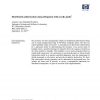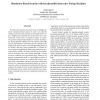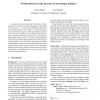CSFW
2006
IEEE
13 years 8 months ago
2006
IEEE
CSFW
2006
IEEE
13 years 8 months ago
2006
IEEE
CSFW
2006
IEEE
13 years 8 months ago
2006
IEEE
A distributed calculus is proposed for describing networks of services. We model service interaction through a call-by-property invocation mechanism, by specifying the security co...
CSFW
2006
IEEE
13 years 10 months ago
2006
IEEE
An attack mutation algorithm takes a known instance of an attack and transforms it into many distinct instances by repeatedly applying attack transformations. Such algorithms are ...
CSFW
2006
IEEE
13 years 10 months ago
2006
IEEE
Abstract. Interactive programs allow users to engage in input and output throughout execution. The ubiquity of such programs motivates the development of models for reasoning about...
CSFW
2006
IEEE
13 years 10 months ago
2006
IEEE
There is a growing interest in establishing rules to regulate the privacy of citizens in the treatment of sensitive personal data such as medical and financial records. Such rule...
CSFW
2006
IEEE
13 years 10 months ago
2006
IEEE
This paper presents an embedded security sublanguage for enforcing information-flow policies in the standard Haskell programming language. The sublanguage provides useful informa...
CSFW
2006
IEEE
13 years 10 months ago
2006
IEEE
CSFW
2006
IEEE
13 years 10 months ago
2006
IEEE
Recently, there has been much interest in extending models for simulation-based security in such a way that the runtime of protocols may depend on the length of their input. Findi...
CSFW
2006
IEEE
13 years 10 months ago
2006
IEEE
A common theoretical assumption in the study of information flow security in Java-like languages is that pointers are opaque – i.e., that the only properties that can be observ...



